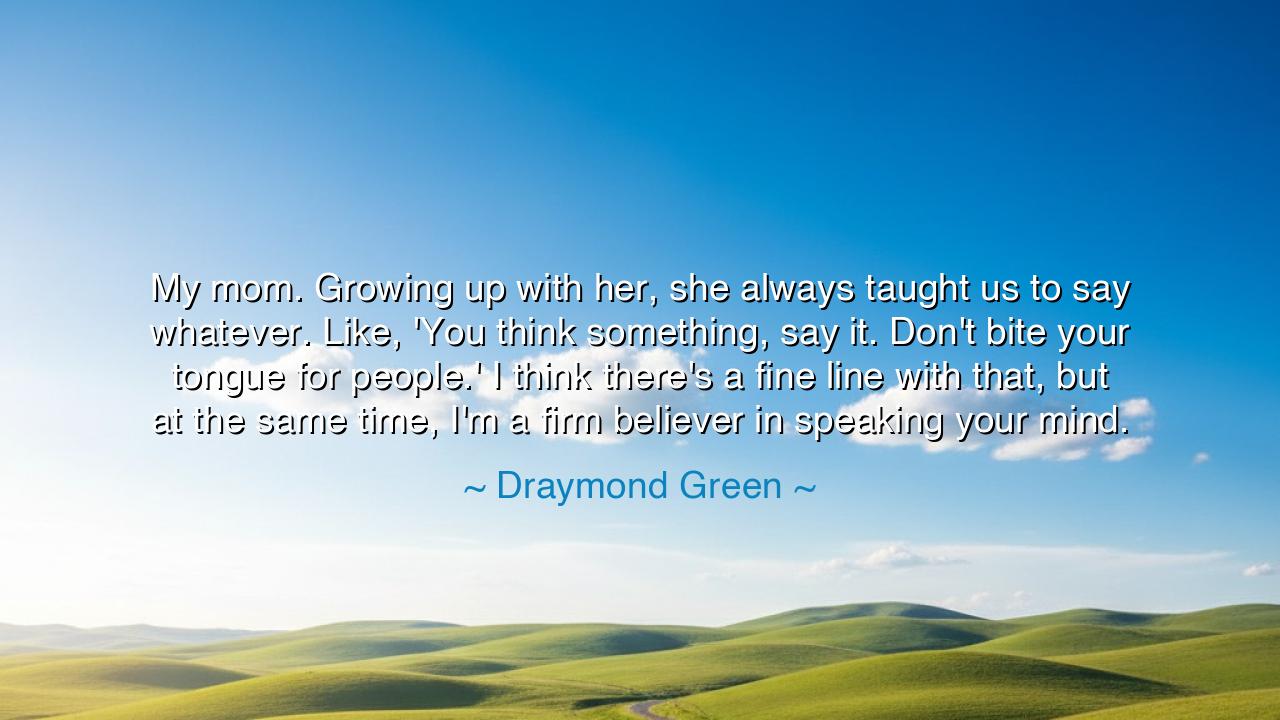
My mom. Growing up with her, she always taught us to say
My mom. Growing up with her, she always taught us to say whatever. Like, 'You think something, say it. Don't bite your tongue for people.' I think there's a fine line with that, but at the same time, I'm a firm believer in speaking your mind.






There are lessons that echo across a lifetime, often imparted not through formal instruction but through the quiet force of example. Draymond Green reflects on one such lesson when he says, “My mom. Growing up with her, she always taught us to say whatever. Like, 'You think something, say it. Don't bite your tongue for people.' I think there's a fine line with that, but at the same time, I'm a firm believer in speaking your mind.” In these words lies a principle as old as civilization: the courage to voice one’s thoughts, tempered by wisdom and discernment. It is a teaching about integrity, presence, and the power of honest expression.
To speak one’s mind is both an art and a responsibility. Green’s mother encouraged openness, insisting that silence should never be default when thought and feeling demand expression. Ancient philosophers, from Socrates to Confucius, emphasized the moral imperative to articulate truth, for it is through dialogue and expression that justice, understanding, and clarity are achieved. The admonition to speak, however, comes with the recognition of a “fine line”—a line between candidness and thoughtless speech, between integrity and incivility.
Throughout history, those who spoke their minds have shaped destinies and altered the course of nations. Consider Sojourner Truth, who, in the midst of oppression, raised her voice boldly, demanding recognition of the humanity and rights of Black women. Her words, spoken without fear, transformed the hearts of many and inspired generations. Like Green, she understood that silence can preserve comfort, but expression carries the potential to enact profound change. To speak is to risk conflict, yet to remain silent is to surrender agency.
Green’s reflection also highlights the role of upbringing and example in cultivating courage. The lesson from his mother was not abstract; it was lived, repeated daily, and internalized through practice. This mirrors the ancient belief that virtue is formed not merely by study, but by habituation. Plato and Aristotle alike argued that character is cultivated through repeated action and guidance, and Green’s embrace of speaking his mind demonstrates the enduring impact of parental example and disciplined cultivation of personal integrity.
Yet, as Green acknowledges, there is a balance to maintain. Freedom of speech does not absolve one from the consequences of words. There is wisdom in discernment—knowing when to speak and when to listen, when to challenge and when to yield. Even Socrates, whose dialectical method challenged every citizen of Athens, understood the necessity of timing, context, and the weight of consequence. Green’s recognition of the “fine line” echoes this timeless tension between courage and prudence.
The principle extends beyond individual growth; it shapes leadership, community, and culture. Leaders who communicate with honesty and clarity inspire trust, unity, and action. In contrast, suppression of thought breeds misunderstanding, resentment, and stagnation. Draymond Green, as an athlete and public figure, embodies this lesson: his willingness to articulate his perspective fosters dialogue, challenges complacency, and reinforces the power of presence in both sport and society.
From this reflection, a universal lesson emerges: cultivate the courage to express yourself, but temper it with awareness and respect. Speak truthfully, thoughtfully, and with conviction, and recognize that words are instruments of influence. By balancing honesty with discernment, one honors both self and community, creating a path for understanding, progress, and authentic connection.
Thus, let Green’s words guide us: do not hide your thoughts for convenience, nor speak rashly without reflection. Let the lessons of those who raise and mentor you instill confidence, integrity, and discernment. In doing so, you not only affirm your own voice but honor the tradition of dialogue, wisdom, and courage that has sustained humanity from the amphitheaters of Athens to the courts of modern arenas. Speak, but speak well; express, but with care; and in that balance, live fully.






AAdministratorAdministrator
Welcome, honored guests. Please leave a comment, we will respond soon